#ventrale
Note
I'm genuinely sorry, I was really tired and couldn't think of the word that mad pride movements use. I'm new to all of this. I thought you would be more open to it because you've reblogged from radical leftists (anarchists and communists both) within the past couple of weeks and they're all for Veganism afaik. The argument that all brains are different but equal and should be treated the exact same is a primary aspect of mad pride from my understanding, and that speaks to me about animals just having different brains, and that they don't deserve to be exploited and killed for us just because they're different. I'm not spamming people with it, but I was inspired by an ask by a nonvegan and started asking popular bloggers why they weren't vegan to open up conversation and potentially change people's views on animals. If I've made you uncomfortable I'm sorry, though I admit I'm really confused by your standpoint. You do know that the only reason communism hasn't succeeded is because of America? Anyway, sorry again, I'm also autistic and I didn't mean to dismiss your legitimate dietary needs. Can I recommend acti-vegan's posts? While I understand that you can't go vegan, perhaps their blog will at least help you understand our points, they're much more well-written than my asks and they have plenty of legitimate science resources at hand. Thanks for listening, I'll take your advice into account. I'm not trying to not listen, it's just frustrating because so many people say they get it but they don't change, and if they truly got it they would, you know?
Okay, I get that you didn't mean to be offensive, and fuck knows I shouldn't throw stones when it comes to forgetting specific words. (This happens to me fairly frequently; it's a thing.)
The argument that all brains are different but equal and should be treated the exact same is a primary aspect of mad pride from my understanding, and that speaks to me about animals just having different brains, and that they don't deserve to be exploited and killed for us just because they're different.
So yesterday I actually wrote out and then deleted a whole paragraph to the effect of "part of my deep, deep frustration with animal rights activism hooks into my commitment to the phrase 'nothing about us without us,' because I frequently see the same kinds of emotional projection without making the effort to listen to animals on their own terms from animal rights activism groups."
The first thing I need to make clear to you is that this--veganism and animal rights activism (ARA) more generally--is not new to me. I am in my mid-thirties and I have never had a job of any kind that did not revolve around animals in some way, I've spent time in rescue spaces and vets and universities, I'm queer and I have spent most of my life in leftish progressive circles, so it's kind of hard to miss.
Essentially, you are proselytizing to me as if you were a newly baptized evangelical convinced I had never heard of Jesus, because if only I had heard and understood his holy word, I would be converted instantly to his light! It's not any less irritating when the belief system isn't explicitly a religion.
More under the cut, because this one is long.
Disclaimer one: Veganism isn't synonymous with ARA ideology, but it's deeply entangled with it, and ARA ideology drives the movement of veganism as a (theoretically non-religious) ethical decision. And I object very strongly to the framework imposed by ARA activists. When I say I am not vegan, I am saying that I have considered the ethical framework that underpins veganism as an ethics movement and I have deliberately rejected it.
The second piece of context you should know that when I talk about being a behavioral ecologist, I mean that I'm a researcher who works on animals and that my framework is rooted in trying to understand animals in their own natural ecological context, without necessarily comparing them to humans. There's a lot of ways to study animal behavior you might run into, including attempts to understand universal principles of behavior that transcend species (animal cognition) and attempts to understand how to better treat animals in human care (animal welfare). You know Temple Grandin? Temple Grandin is an ethologist (the field that gave rise to behavioral ecology, also focused on animals within their species context) who worked on animal welfare (finding ways to make slaughterhouses less stressful to livestock, among other things).
Third point: my profession also means is that I work directly with animals--in my case, currently mice--and that I do not think research with animal subjects is wrong as long as all efforts are made to ensure maximal welfare and enrichment for the animals involved. This is another major bone of contention politically between my entire field and ARA groups, and you should know that I have also spent my entire professional career under the shadow of, well, people who care strongly enough about those ideas to invade my workspace and potentially seize my animals and "free" them into a world they do not have the tools to survive in.
So there's where I am coming from. Let's get back to what you're saying. Here, I'll quote again in case you have the same crappy short-term memory I do.
The argument that all brains are different but equal and should be treated the exact same is a primary aspect of mad pride from my understanding, and that speaks to me about animals just having different brains, and that they don't deserve to be exploited and killed for us just because they're different.
Point the first: Even within humans, I don't think that all brains should be treated the exact same. Especially in a disability context! After all, what is an accommodation if not an agreement to treat someone differently because they need certain things to access a space? Accommodations by definition fly in the face of this "treating everyone the same" understanding of fairness. I think all (human) brains are equally valuable, and I think all brains are worthy of respect, but I do not think that it's wise or kind of me to assert that everyone should be treated in the same way. For one thing, I teach students. If there's one thing teaching has taught me, it's that a good teacher is constantly assessing and adjusting their instruction to meet students where they're at, identify failures of understanding, and keep the attention of the classroom.
Point the second: animals do have different brains from humans. That does not mean that animals are inferior, but it does mean that they are alien. There's a philosophy paper, Nagel, What Does It Mean to Be a Bat, that you might find illuminating on this front. Essentially, the point of the paper is that animals have their own experiences and sensory umwelts that differ profoundly enough from humans' that we cannot know what it is like to be a different species without experiencing life as one, and therefore we must be terribly careful not to project our own realities onto theirs. That is, our imagination cannot tell us what a bat values and what it experiences. That is why we have to use careful evidence to understand what an animal is thinking, without relying on our ability to identify with and comprehend that animal. I have watched ARA groups deliberately encourage people to shut their reasoning brains off and emotionally identify themselves with animals without considering within-species context for twenty years. This is a mainstream tactic. It is not an isolated event and for that reason alone I would be opposed to them.
Point the third: there is a definite tendency in lots of people to care deeply and intensely about both animals and people who are seen as "lesser" in status--children, poor people, disabled people, etc--just as long as those groups never contradict the good feelings that come from the helper's own assessment of themselves and their actions. In humans, when the "needy" point out that some forms of help are actually harmful, the backlash is often swift and vicious. This is why animals are such an appealing target of support and intervention. They can't speak back and say "in fact, you are projecting my love of this frilly pink tutu onto me, and I think it's uncomfortable and prevents me from walking." They can't say "I kind of like it better when I don't have to worry about getting hit by a car, actually?"
(By the way: this is also why it's offensive to compare disabled people to animals, because this is generally done at least in part to silence the voices of disabled people speaking for our selves and our communities. We have access to language, and we use it, thank you.)
All forms of animal welfare intervention going right back to the founding of the first RSPCA have been incredibly prone to being hijacked by classist, racist, and otherwise bigoted impulses. This is because animals offer an innocent face for defense that conveniently cannot criticize the actions taken by their champions, and they therefore provide a great excuse for actions taken against marginalized members of human society. Think about the very first campaign the RSPCA ever did, which was banning using dogs as draft animals: a use that is not inherently harmful to dogs, which many dogs actively enjoy, but also one that was specifically used by poor Londoners and which in fact immediately resulted in a great butchery of the dogs that Londoners could no longer afford to feed rather than allowing poor people and their dogs to continue working together. No one was, of course, challenging the particular uses of dogs or any other animal favored by the wealthy. This kind of thing is so, so, so common. Obviously it doesn't mean that all interventions to prioritize animal welfare are inherently bigoted, but it does mean that we have to be critical about our choice of challenges.
On top of everything, the animal rights activist movement's obsession with "exploitation" is a function of the idea that humans are sinful or otherwise Bad in how we interact with animals by definition. For example, take the chicken rescue near me that is so obsessed with the possibility that some human somewhere might benefit from an animal in their care that they implant every hen they adopt out with hormonal implants such that the hens no longer lay eggs--a function that is normally a natural byproduct of a chicken's reproductive system, fertilized or not. A mutualistic relationship involves both parties benefiting, and that is the case for an awful lot of human relationships with animals. In general, the idea that associating with animals is a thing that can only harm animals rather than being a trade between two species to enrich one another is all over these groups. It's just so myopically focused on human shame that it prevents practical interventions that might benefit everyone, and often promotes interventions that don't directly benefit animals but sure do make humans miserable. For example, this kind of thinking is why groups like PETA are absolutely awful at effectively rescuing unwanted dogs and cats: they think pets living in "bondage" with humans are an essentially sad outcome, rather than one that might be mutually enjoyed by all parties.
I'm tired and my meds haven't kicked in, so I'm not currently going to handle the communism thing except to point out that while the US absolutely did destabilize a number of leftist regimes in South America and Africa, Russia and China between them have certainly not treated their own people kindly, either (and more so their own client-nations, as with the former members of the USSR). Please do some reading about the Holodomor and Lysenko in Russia (and frankly all of the details of Stalin's regime) and the Cultural Revolution in China in particular. Khmer Rouge might be worth looking into, too. I am not saying the US's hands are clean, you understand, because they are not; they're as steeped in red as anyone else's. What I am saying is that for people living on the ground, communist revolutions have this nasty habit of turning into bloodbaths and arbitrary slaughters. Do not let your distaste for the US's bloodsoaked imperialism (which, yes, is and was bad) let you fall into the trap of becoming a tankie.
And if you don't know what a tankie is, you really, really should take some time to learn.
#animal welfare#just#don't do this#when someone says “no”#please fucking listen#there's another essay in me somewhere on the painfully obvious sublimated dynamics picked up from Christianity all over this movement#but I do actually have work to do today including that ventral pallidum post I have been poking at
718 notes
·
View notes
Text

Sketching the new guys. They're like pangolin + squirrel + gecko with a touch of mole
#flight rising#fr art#dusthide#jem draws#frfanart#i wish more of the breeds had only the inner wing as secondaries#absolutely love the look of the ventral side being primary
1K notes
·
View notes
Text
chat, please enjoy mariana trench/deep-sea serpent toothless :D

#he's a little glow-y guy#except he's actually huge#hiccup is about as tall as the sort of ventral fin on his tail#listen he's a dragon it doesn't have to be accurate it just has to look nice#this is based off a fic i've had in the drafts for years 😭#finally letting something of it see the light of day#httyd#httyd toothless#toothless#httyd dragons#httyd fanart#httyd au#toothless fanart#hiccup and toothless#technically#the fic is all about them as expected#httyd fandom#httyd fanfiction#fanart of fanfiction#i guess#mariana au
50 notes
·
View notes
Text

the big three mfs
#paleoart#tyrannosaurus rex#spinosaurus#giganotosaurus#on that basal snakelike ventral scale that coelurosaurs lost grind#except I botched the scales on giga lmao#I drew these on my birthday a couple days ago#adding the dinosaurs tag cause I forgot ;-;#dinosaurs
15 notes
·
View notes
Text


Wtf even. Human AUing everybody. Guy. the snake from guys backstory. Indulgence
#myart#s#He has a nose like this. cus hes just a guy and not some snake fusion thing#T tattoo tour: snakeroboros on cheek RECKONER on jaw lightning bolts on both temples weird eldritch tentacles on skull#inuit chin lines (on 100% white man mind) Leonidas on deltoid snake eyes on bicep snake spacer ventral scales on neck greek helmet on trice#And deeply ironic I <3 u daddy tatted from when s was a kid.
10 notes
·
View notes
Photo

POC / Ventral Air Mips EF Education-Easypost / Helmet / 2023
39 notes
·
View notes
Text

Reference for the character I'm playing in @tales-ofthe-ancients-rp ! Love Fishbone so much already so be prepared to see more doodles with them hehe.
#character reference#paleoart#digital art#my art#oc: fishbone#rp character#quick edit since someone pointed out I had the ventral and dorsal sides mixed up lol
40 notes
·
View notes
Text
I am very serious about this. If someone gets me Kar'niss's character model I can properly sex him for you and then we can all stop debating about whether or not his spider half is female and whether or not that was a mistake.
#body shape doesn't tell you shit#lack of boxing gloves also doesn't tell you shit#ventral sexing (what I'd be doing) is also sorta unreliable#but I could do it#and if he has an epigynum then we'd have our answer#but the ideal way to sex a spider is with a molt#so someone bring me his old skin too#kar'niss#baldur's gate 3#bg3
9 notes
·
View notes
Text
How to draw Bird and Angel Wings Feathers
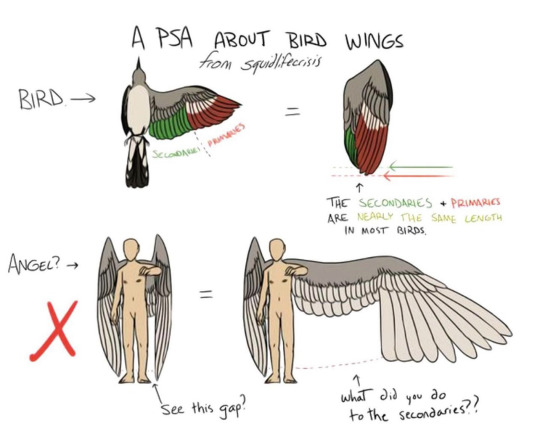
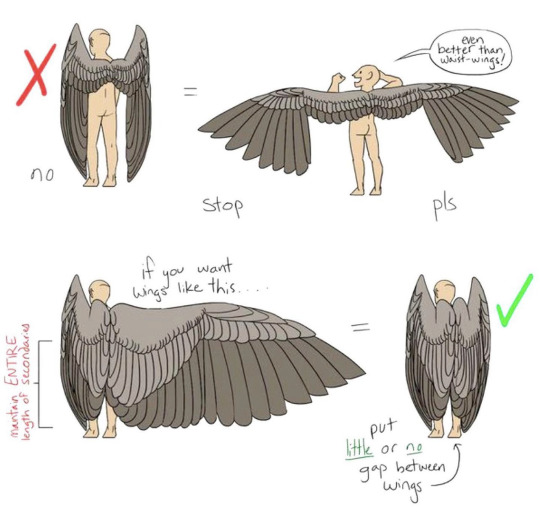
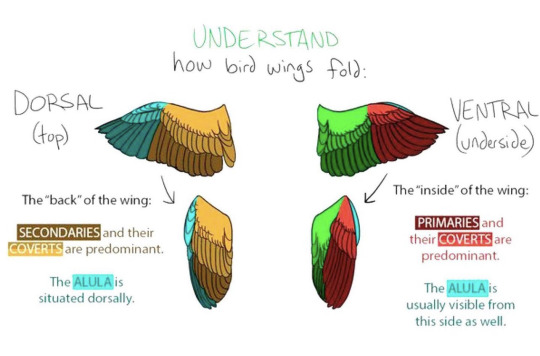
Credit: Est_cow (twitter)
#random tip#random tips#tip#bird#birds#flying#wing#wings#feather#feathers#animal anatomy#secondaries#primaries#dorsal#ventral#coverts#alula#angel#angels#demon#creature#creatures#monster#monsters#art tutorial#drawing tip#art tip#art tips#fantasy#Supernatural
20 notes
·
View notes
Text
Somatic Series Unit 2, Ch.10: The Body Scan
Welcome back to Unit 2 of the Somatic series!
This series is where I’m using somatic psych theory to help people learn and map out their autonomic nervous system, develop a healthier relationship with themselves, and eventually build stronger communities.
Unit 2 focuses on explaining and demonstrating how to use 3 somatic exercises (Grounding, Body Scanning, and the Notice and Name Exercise) to…
View On WordPress
#autonomic nervous system#dorsal vagal#shutdown#somatic#somatic series#somatic theory#somatic therapy#ventral vagus
3 notes
·
View notes
Photo
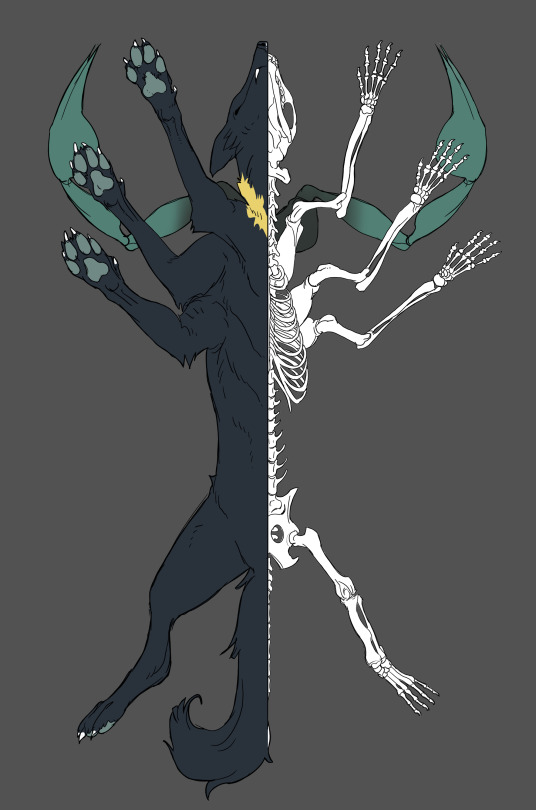
Angor
Commission for Valyce Negative - Thank you!
#furry#anthro#furryart#jackerpillar#jackal#caterpillar#anatomy#skeleton#ventral#multi-limbs#multilimbed#feral#scorpion#pincers#diagram
15 notes
·
View notes
Text


november vs now
#he still has a long way to go#but im very very happy with his fin regrowth and revitalized activity#elijah.png#betta fish#the newer pic is actually a few weeks ago he’s had even more fin regrowth since then#it’s also hard to properly see the amount of regrowth compared to the older pic but his#pectoral and ventral fins were almost nonexistent back then but now they’re much longer and opaque#his caudal fin especially has had a lot of regrowth as well#im still worried about his health (he’s obviously still not in good condition) but wayyyy more optimistic than when i got him
6 notes
·
View notes
Text
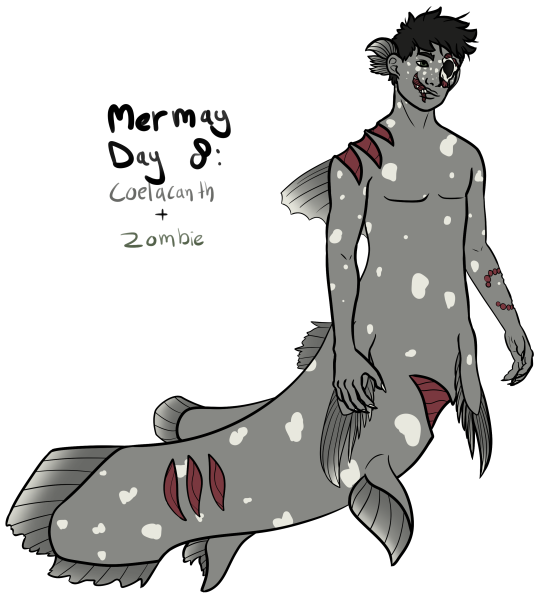
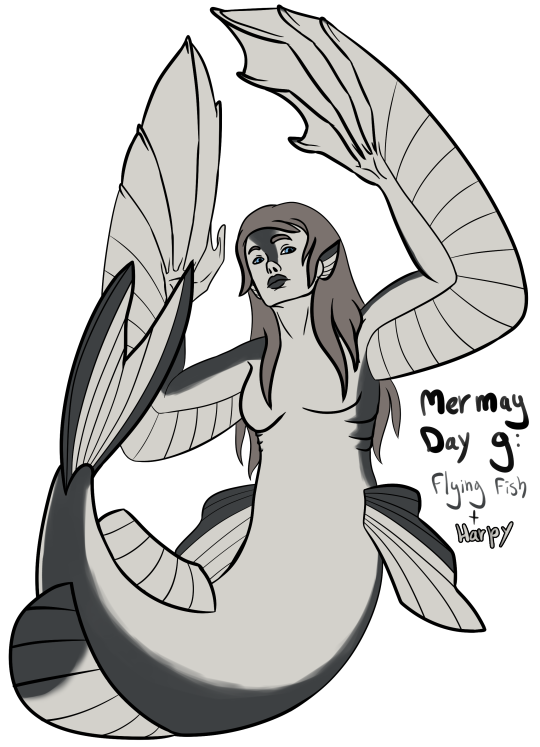
Ended up taking a few more days off than intended because my desk collapsed so I had to wait for a replacement. :U Anyway I'm still gonna try to catch up so here's a double entry for Mermay days 8 and 9. I started on 10 too but couldn't get it done before my wrist gave up, unfortunately.
#mermay#mermay 2023#mermaychallenge#mermaid#harpy#zombie#dark art#anyway this fucking harpy is cursed I think#accidentally flipped the dorsal and ventral fins on the tail#somehow fucked up the far hand beyond recovery#and I FORGOT TO COLOR THE FUCKING EYEBROWS GOD DAMMIT#*quickly goes and edits it AGAIN*
9 notes
·
View notes
Text
Two spider firsts today: a new Theridiid, and a recent molting.





My best guess for the ID on this one is the Enoplognatha ovata or candy-striped spider. The species has a few different color morphs; this cream-ish version is probably the most boring one but I will not hold that against her
EDIT: Western black widow (Latrodectus hesperus), juvenile
#the legs have more bands than most of the reference photos I found#and the ventral side isn’t an exact match#so that’s why I’m not more confident lol I might need help on this one#spiders#eight-legged friends
14 notes
·
View notes
Text
We can speak of trauma when that system fails: when you beg for your life, but the assailant ignores your pleas; when you are a terrified child lying in bed, hearing your mother scream as her boyfriend beats her up; when you see your buddy trapped under a piece of metal that you're not strong enough to lift; when you want to push away the priest who is abusing you, but you're afraid you'll be punished.
"The Body Keeps the Score: Mind, brain and body in the transformation of trauma" - Bessel van der Kolk
#book quote#the body keeps the score#bessel van der kolk#nonfiction#vvc#ventral vagal complex#vagus nerve#trauma#ptsd#dv#domestic violence#trapped#fear#terror#metal#abuse of authority#abuse of power#child abuse
7 notes
·
View notes
Note
how did you come to find that God could be trusted? how do you think God wants us to build that trust? where is trust physically found for you?
i spent a long time not trusting god and doing a lot of testing to see if i was going to be pushed past my emotional boundaries and taken advantage of. i have trust issues so i won't act like i never do this anymore lmao....but i'm pretty convinced now that god will be gentle with me and that what god wants is a deep relationship and way of being-with us to which coercion is antithetical. how this is built is pretty individual i think but it's probably going to take a lot of time. and i would say the way trust manifests physically for me is a sense of safety and deep relaxation.....i often find myself releasing tension i didn't know i had and switching from sympathetic to parasympathetic nervous system function.
#at least i think thats whats happening. i am not a neuroscientist#theres interesting theories regarding vagus nerve function particularly but theyre disputed so i take them with a grain of salt but have#prompted some fascinating techniques and results in certain horse training circles im in wrt activating the ventral branch of the vagus#nerve to address anxiety and trauma....extrapolated from people but due to the way i am i know more about it in horses lmao#the ask tag
16 notes
·
View notes